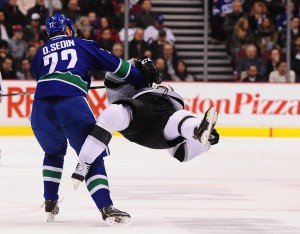
A few days ago, OnMilwaukee.com contributing writer Dave Begel authored an article explaining why, despite a long history around the game, he didn’t care for hockey. He complained that the puck was hard to see and the game was both too brutal and too fast. Furthermore, he couldn’t comprehend the “substitution” rules and opined that games should be played outdoors with the players wearing scarves and mittens — with cheerleaders serving hot chocolate.
He summed up his feelings with two words: “Hockey? Meh!”
Not surprisingly, he was roundly condemned in the article’s comments section as well as on social media. Of the hundreds of replies, most centered around his confessed lack of understanding of the game. They weren’t especially kind.
Millions and growing of hockey fans care & love the arena speed, physicality and have zero problem seeing the puck. https://t.co/nso5pVLgIM
— 𝗦𝘁𝗲𝘃𝗲𝗻 𝗗𝗮𝘃𝗶𝗱 (@Garts2point2) June 17, 2015
How big of a dumbass is this writer? https://t.co/MG42QWnLF9
— Michael Pechovnik (@Chov15) June 16, 2015
Never fear, Mr. Begel: The Hockey Writers is here to help. Knowledge is power, and we’re confident that if you merely understood what you were writing about, you’d feel differently. At the very least, that angry horde of internet villagers carrying torches might head to Frankenstein’s castle instead.
The puck
It’s true that the puck moves at a rapid, often frenetic pace. Admittedly, sometimes it isn’t easy to spot amidst a sea of bodies in the corners or in front of the net. But like anything, practice makes perfect, and after a mere handful of games, you get the hang of it. When you can’t see the puck, watch the players — they chase it around like a pack of lions circling a scampering meerkat.
Speaking of the puck, a regulation-sized hockey puck is three inches in diameter and one inch thick, weighing about six ounces. A regulation-sized baseball is about three inches in diameter and weighs approximately five ounces.
Obviously, they aren’t shaped the same, but the mass of a puck is clearly substantial. It’s not as if hockey is played with a checkers piece. It’s also black, providing contrast against the white ice.
Tell me you can’t see Patrick Kane bury the puck in this classic one-timer that clinched the Cup for Chicago:
Line changes
“Substitutions” are for people on Weight Watchers. In hockey, players enter and exit the ice via line changes, which happen roughly every 40-50 seconds and are often highly situational.
Good play is frequently rewarded with more ice time, poor play less. I’ve seen Dustin Brown mope on the bench for most of the remainder of the game after a brutal first two periods, and star defenseman Drew Doughty play well over half the game. Coaches routinely juggle minutes, chemistry and line matching all game long. Much like my speeding tickets, the process is anything but random.
Brutality and boards
Hockey is a contact sport, and yes, players do throw body checks all over the ice. It shouldn’t be surprising that the crowd roars its approval when one of the hometown heroes smashes an opponent into the boards, as it’s the exact same physics (minus the skates) that make football so appealing.
How can you not enjoy seeing Stephen Gionta tumble into the bench?
Hockey can be a rough sport to be sure, but the players are particularly tough hombres. When they get hit, they get right back up.
Too fast
There are lots of stoppages in hockey. The whistle blows for all sorts of reasons, including penalties, icing, offsides, time outs, hand passes and other situational events.
I’ll refrain from the obvious Miracle Ear jokes.
Too indoors

Hockey actually has a handful of outdoor games (the Winter Classic and the Stadium Series) every year. As for it being “too indoors”, ice had a tendency to melt in the rain.
Hockey arenas typically have character. Staples Center beats a mosquito-filled Minnesota pond any day of the week.
Turn back the villagers
Well, that’s about it. We’ve addressed each of your reasons and shown that what’s behind your dislike for hockey is a simple lack of understanding. Despite your claims, you clearly haven’t watched the game closely enough to have a clue. Our recommendation: get a clue.
This has been a public service message. Villagers, sheath your torches.